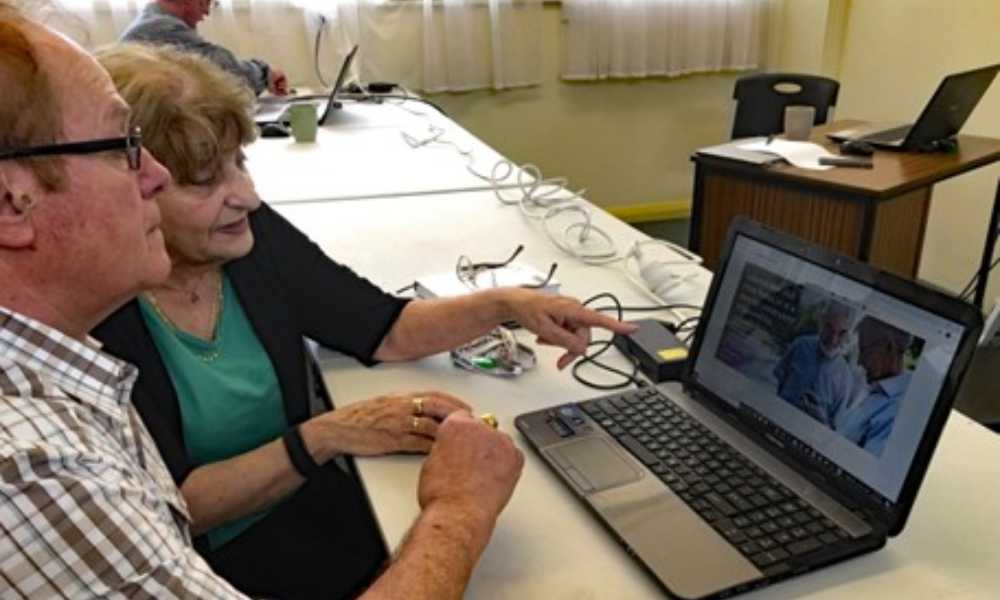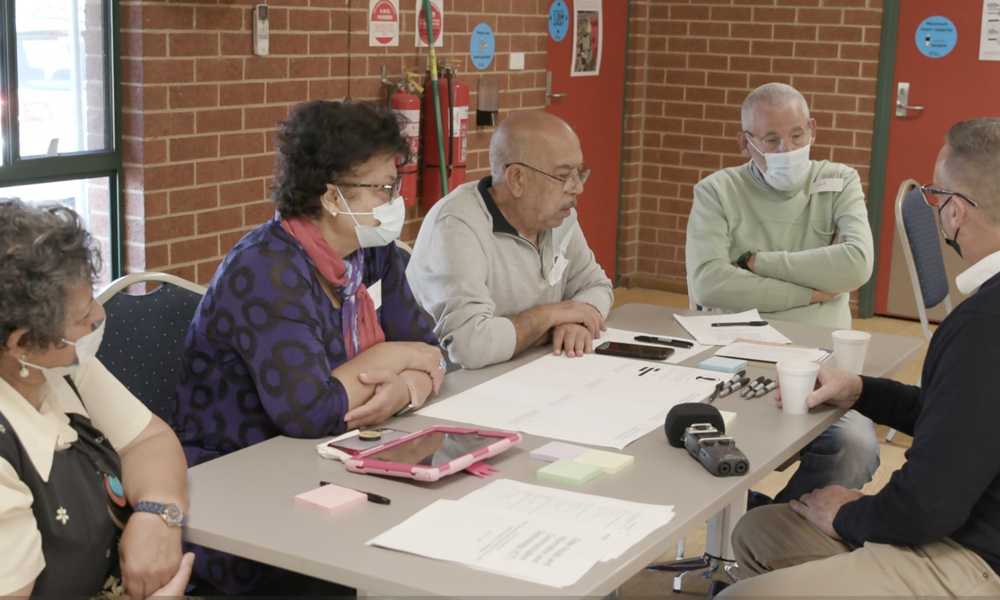
ICT and older adults in the City of Whittlesea
Understanding their aspirations, barriers, and strategies to support them.
ICT and older adults in the City of Whittlesea (apo.org.au)
The COVID-19 pandemic highlighted how digital engagement is crucial for fostering social inclusion for older adults`. It provides them with the capacity to take up information and communication technologies (ICT) which is critical to their wellbeing and enables them to navigate barriers. This report explores the aspirations and barriers encountered by older adults in the City of Whittlesea and offers strategies to support them in overcoming these barriers.
This report addresses three topics of interest to the City of Whittlesea for the development of support programs for older adults - aspirations of older adults to adopt technology, barriers preventing older adults from taking up technology, and strategies to support older adults.

An outcome from the research was the development of a range of digital resources and tools to support older adults with improving their digital skills. Interactive Resources | Shaping Connections
These tools assist individuals and digital mentors assess their skill level and offers strategies to overcome barriers. Culturally and Linguistically Diverse (CALD) community groups require substantial support to engage with technology. Technology education should be in the contexts of interests of individual CALD communities.
Shaping Connections – a partnership between RMIT University’s School of Economics, Finance and Marketing and the University of the Third Age – has been working with seniors to co-design strategies to address their concerns around Information & Communication Technology (ICT) use.
 Community leaders play a critical role in helping seniors grapple with the world of digital technology according to a new Australian study.
Community leaders play a critical role in helping seniors grapple with the world of digital technology according to a new Australian study.
No matter who you are, there’s no overstating the importance of solid digital competency.
Whether it’s for shopping, socialising, health care or entertainment - or simply avoiding online telephone scams - the benefits of digital skills and knowledge are immense.
Yet many Australians still struggle with information and communication technology (ICT).
This is especially the case for older Australians, whose unique experiences define how they connect with digital technology and who they are willing to turn to for help to learn how to make the most of it.
New evidence from Shaping Connections – a research partnership between RMIT University’s School of Economics, Finance and Marketing and the University of the Third Age - reveals the people and social institutions, referred to as socialisation agents, who older adults are most likely to turn to for ICT knowledge.
The research has revealed the critical role community leaders such as education experts in TAFE's, Universities and social organisations such as computer clubs, must play in ensuring this knowledge is both relevant and helpful.
Unsurprisingly, older adults' most common socialisation agents are younger family members, particularly their children and grandchildren.
They are the first port of call, not always because they are perceived to be experts but because of an expectation of reciprocity: "Older adults taught their offspring life skills and often felt that their offspring should return the favour and teach their parents."
Yet this expectation often brings complications.
Digital frustration
Participants in the study highlighted the frustration, embarrassment, and general lack of appreciation for the difference in skill levels that came with seeking help from family members.
“There is a big distance in technology [between parents and children], which is something I can’t say [to my children]”, said Muhammad (not his real name), 65, one of the study’s participants. “It’s embarrassing... because the children always think their father can do anything. Should do anything.”
This divide, the researchers say, is why additional socialisation agents, such as community leaders, are often responsible for providing seniors with the most relevant and valuable ICT knowledge.
“Family members play an important role in helping older adults deal with more immediate ICT concerns. However, the additional sources prepare them to be digital consumers, " explained Associate Professor Bernardo Figueiredo, one of the study's authors.
“In our interviews, participants frequently shared stories of children or grandchildren getting frustrated about having to show them something on their device multiple times without actually explaining what they were doing, or even making patronising or dismissive remarks based on stereotypes about the relationship between seniors and digital technology.
“So, when they seek support elsewhere, that’s often when they start to find true understanding.”
“Negative experiences from attempts to learn from family, or fear of such experiences, often leads older adults to seek self-education.”
Dr Torgeir Aleti.

It’s not the work of socialisation agents alone that provides seniors with a beneficial ICT education. Another factor must also be considered: the seniors’ internal agency – or capacity for ‘self-socialisation’.
“Negative experiences from attempts to learn from family, or fear of such experiences, often leads older adults to seek self-education”, said Dr Torgeir Aleti, another of the study's authors.
“Some turn to non-human agents for help, such as Google or YouTube, though some are not at that knowledge threshold.
“In either case, the desire to receive education is an important step in utilising the strategies we’ve co-created with the older adults that participated in our research.”
The Shaping Connections team have been working with older Victorians over several years to co-design strategies to help seniors learn to use tech, and they are eager to see others put their process to use.
Community leaders hold the key
The process sees seniors undertake workshops using self-assessment tools to help them express their technology use issues, guided by community leaders.
Their concerns are given form as personas, and scripted examples of experiences these personas may face are presented to the groups. Workshop leaders encourage participants to discuss and develop strategies on how their personas can overcome the perceived risks.
Through this process, seniors articulate their fears and concerns indirectly, so they don’t feel judged or experience the same frustrations they may with family members.
“While the co-design workshops are developed around group activity, participants are treated as individuals with individual needs and skill levels”, says Associate Professor Figueiredo..
“Participants often harbour feelings of inferiority, whether due to a lack of self-confidence or the responses from others they have already asked for help. They look at what their family, or even some of their peers are capable of, and question whether they can do the same.”
Associate Professor Figueiredo said what’s important is that participants are supported in learning ICT skills that will benefit them, and achieving the knowledge they seek.
“Not everyone needs to be at the same level. Not everyone should be.
“That’s why we believe community leaders are essential in co-designing ICT strategies with older adults. They understand the people in their communities and recognise them for their uniqueness.”
Associate Professor Figueiredo said partnerships were crucial to the provision of accessible, judgement-free environments where seniors could develop ICT skills relevant to their needs, interests and aspirations.
He said partnerships with experts from universities or TAFEs – those who understood how to develop education programs – as well as social organisations such as computer clubs or the University of the Third Age could provide the necessary resources and support.
“This is the way to achieve digital inclusion.”
Mitch Ziems is a freelance writer.
Acknowledgement of Country
RMIT University acknowledges the people of the Woi wurrung and Boon wurrung language groups of the eastern Kulin Nation on whose unceded lands we conduct the business of the University. RMIT University respectfully acknowledges their Ancestors and Elders, past and present. RMIT also acknowledges the Traditional Custodians and their Ancestors of the lands and waters across Australia where we conduct our business - Artwork 'Sentient' by Hollie Johnson, Gunaikurnai and Monero Ngarigo.